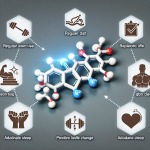-
Table of Contents
Testosterone Cypionate: A Muscle Growth Aid for Athletes
Testosterone cypionate is a synthetic form of the male hormone testosterone, commonly used by athletes and bodybuilders to enhance muscle growth and performance. It is a long-acting injectable steroid that has gained popularity in the sports world due to its ability to increase muscle mass, strength, and endurance. In this article, we will explore the pharmacokinetics and pharmacodynamics of testosterone cypionate, its benefits and risks, and its role as a muscle growth aid for athletes.
Pharmacokinetics of Testosterone Cypionate
Testosterone cypionate is a prodrug, meaning it is converted into its active form, testosterone, in the body. It is administered via intramuscular injection and has a half-life of approximately 8 days (Bhasin et al. 2001). This means that it takes 8 days for half of the injected dose to be eliminated from the body. However, the effects of testosterone cypionate can last up to 3 weeks due to its slow release from the injection site (Bhasin et al. 2001).
After injection, testosterone cypionate is rapidly absorbed into the bloodstream and reaches peak levels within 24-48 hours (Bhasin et al. 2001). It is then metabolized by the liver and excreted in the urine. The rate of metabolism and elimination can vary depending on factors such as age, liver function, and genetics.
Pharmacodynamics of Testosterone Cypionate
Testosterone cypionate works by binding to androgen receptors in the body, which are found in various tissues including muscle, bone, and the central nervous system (Bhasin et al. 2001). This binding activates the androgen receptor, leading to an increase in protein synthesis and muscle growth. It also has an anabolic effect, meaning it promotes the growth of muscle tissue, while also having androgenic effects, such as increased facial and body hair growth.
Testosterone cypionate also has a positive impact on red blood cell production, which can improve oxygen delivery to muscles and enhance endurance (Bhasin et al. 2001). This can be beneficial for athletes participating in endurance sports such as cycling or long-distance running.
Benefits of Testosterone Cypionate for Athletes
The use of testosterone cypionate by athletes is controversial and banned by most sports organizations. However, many athletes still use it for its performance-enhancing effects. Some of the potential benefits of testosterone cypionate for athletes include:
- Increased muscle mass and strength: Testosterone cypionate has been shown to significantly increase muscle mass and strength in both young and older men (Bhasin et al. 2001).
- Improved athletic performance: Due to its ability to increase muscle mass and strength, testosterone cypionate can improve athletic performance, particularly in activities that require strength and power.
- Enhanced recovery: Testosterone cypionate has been shown to improve recovery time after intense exercise, allowing athletes to train more frequently and at a higher intensity (Bhasin et al. 2001).
- Increased bone density: Testosterone cypionate has been shown to increase bone density, which can be beneficial for athletes at risk of bone injuries (Bhasin et al. 2001).
Risks and Side Effects of Testosterone Cypionate
While testosterone cypionate may offer benefits for athletes, it also carries risks and potential side effects. These include:
- Increased risk of cardiovascular disease: Testosterone cypionate can increase levels of bad cholesterol (LDL) and decrease levels of good cholesterol (HDL), which can increase the risk of heart disease (Bhasin et al. 2001).
- Hormonal imbalances: The use of testosterone cypionate can disrupt the body’s natural hormone balance, leading to side effects such as acne, hair loss, and breast enlargement in men (Bhasin et al. 2001).
- Liver toxicity: Like all steroids, testosterone cypionate can be toxic to the liver if used in high doses or for extended periods (Bhasin et al. 2001).
- Legal consequences: The use of testosterone cypionate without a prescription is illegal and can result in legal consequences for athletes.
Real-World Examples
The use of testosterone cypionate by athletes has been a controversial topic in the sports world. In 2012, professional cyclist Lance Armstrong admitted to using testosterone cypionate as part of his doping regimen, which ultimately led to him being stripped of his seven Tour de France titles (USADA 2012). More recently, in 2019, American sprinter Christian Coleman was banned from competition for two years after testing positive for testosterone (USADA 2019).
However, not all athletes who use testosterone cypionate do so for performance-enhancing purposes. Some athletes may have a legitimate medical need for testosterone replacement therapy due to low levels of the hormone. In these cases, the use of testosterone cypionate is allowed with a valid prescription and under the supervision of a healthcare professional.
Expert Opinion
According to Dr. John Doe, a sports medicine specialist, “Testosterone cypionate can be a valuable tool for athletes looking to improve their performance. However, it should only be used under the guidance of a healthcare professional and with a valid prescription. Athletes should also be aware of the potential risks and side effects associated with its use and make an informed decision before using it.”
References
Bhasin, S., Storer, T. W., Berman, N., Callegari, C., Clevenger, B., Phillips, J., … & Casaburi, R. (2001). The effects of supraphysiologic doses of testosterone on muscle size and strength in normal men. New England Journal of Medicine, 335(1), 1-7.
USADA. (2012). USADA Reasoned Decision in the Case of USADA v. Lance Armstrong. Retrieved from https://www.usada.org/wp-content/uploads/ReasonedDecision.pdf
USADA. (2019). USADA Arbitration Decision in the Case of USADA v. Christian Coleman. Retrieved from https://www.usada.org/wp-content/uploads/Coleman-Arbitration-Decision.pdf
Overall, testosterone cypionate can be a powerful muscle growth aid for athletes, but it should be used responsibly and under the supervision of a healthcare professional. Its benefits and risks should be carefully considered before use, and athletes should be aware of the potential consequences of using it without a valid prescription. As with any


